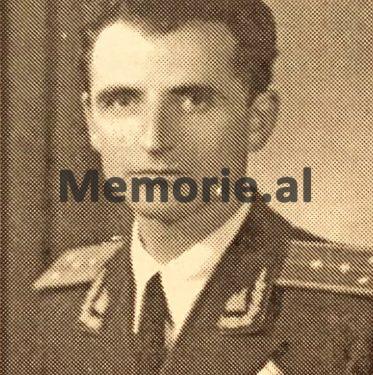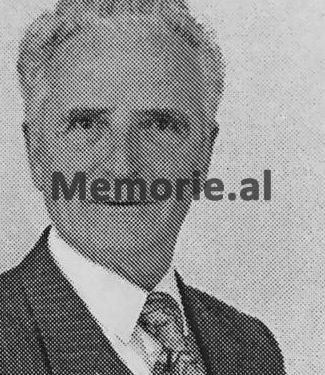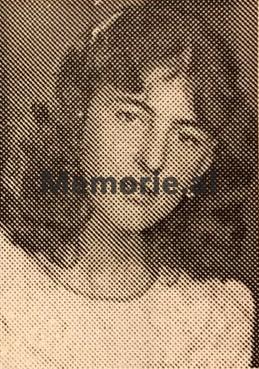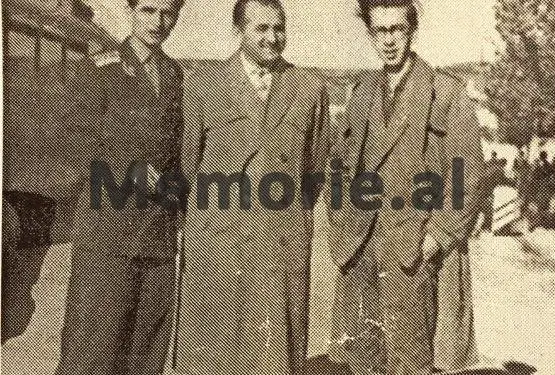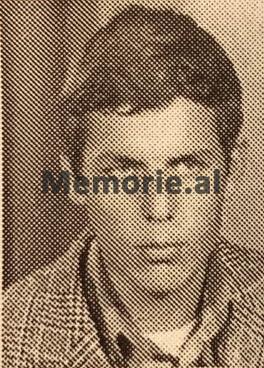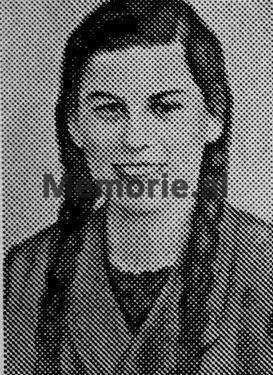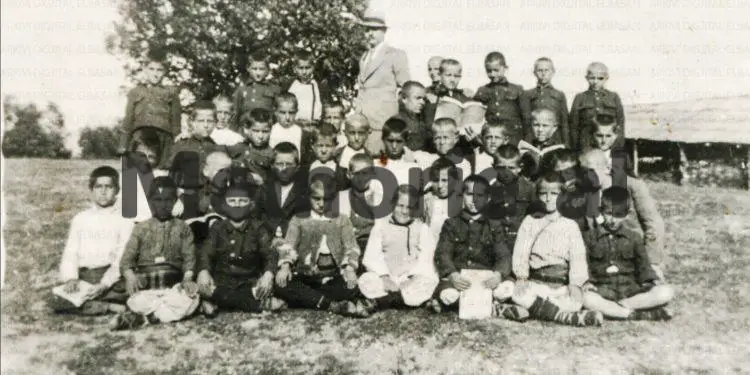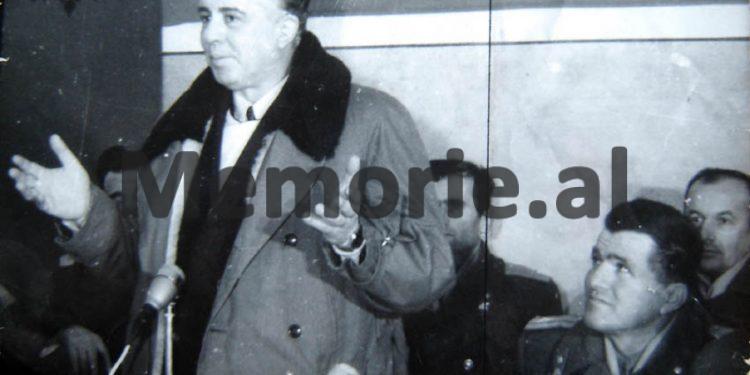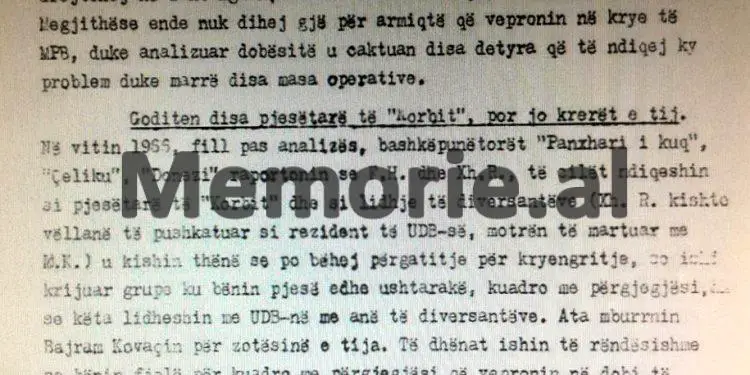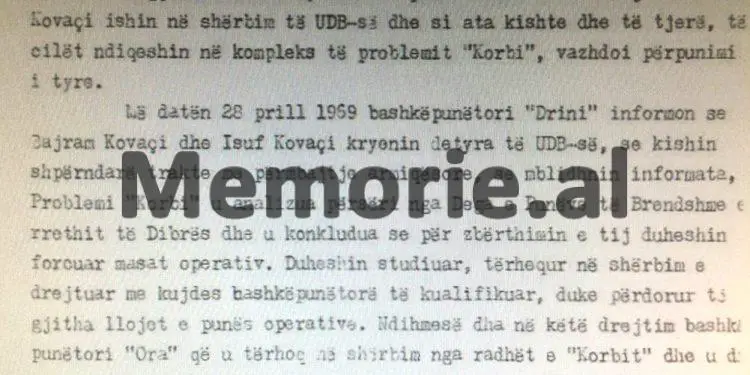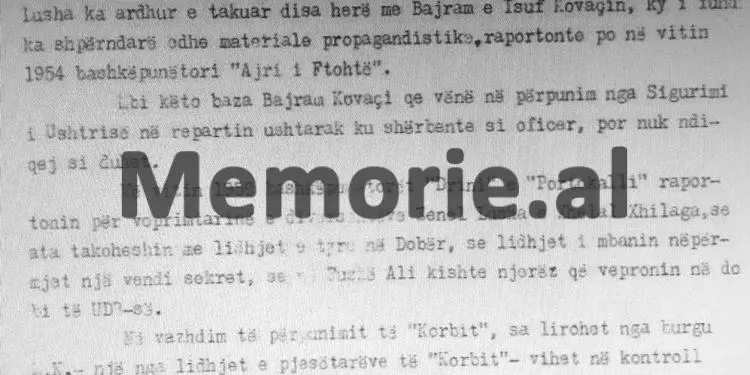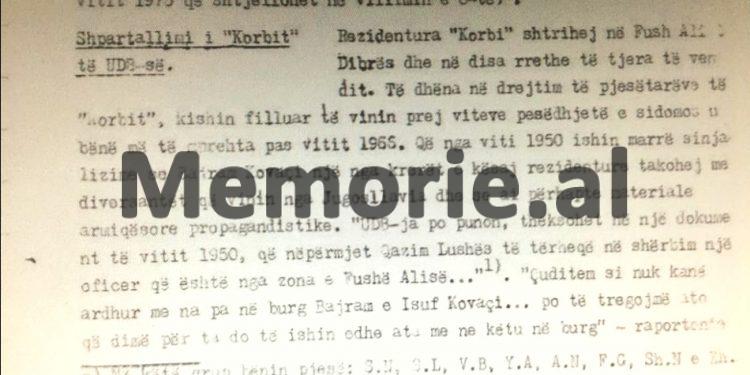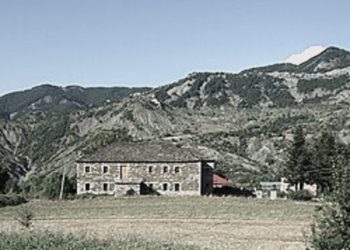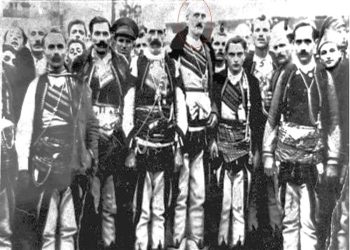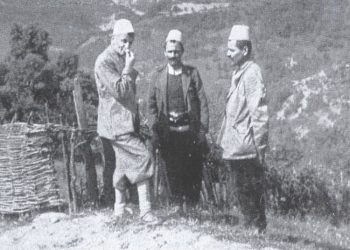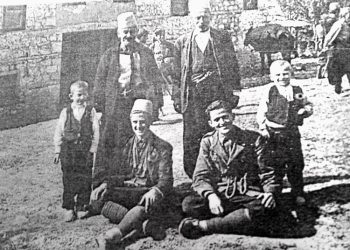Dashnor Kaloçi
Memorie.al publishes the unknown and tragic story of Bajram Hysen Kovac, originally from Fush-Çidhna of Dibra, who after becoming a partisan at the age of 14 participating in the fighting for the liberation of Tirana, after the end of the war was named an officer and served as a personal liaison to the Commander of the Korça Division, Major General Beqir Balluku, taking part in the Provocations of August ’49, where in addition to his military service, he was on the front line of the fighting, kept notes of everything that happened there, which were then sent to Tirana, published in the newspapers “Luftëtari”, “Bashkimi”, “Zëri i Popullit” etc., making him the only journalist who followed the fighting at the front.
Bajram Hyseni’s long career as a military journalist in the newspaper “Luftëtari”, where he worked until 1956 after the Tirana Conference, when in a meeting held at the High School of the Party “Vladimir Ilic Lenin” in Tirana, he asked some questions to Enver Hoxha, regarding the accusations made against Murat Kaloshi and the treatment of his fellow villagers in Fush-Çidhna, about the attitude they had taken during the war, questions which would cost them dearly then, changing the whole course of life.
The demobilization of Bajram by the Army after the meeting held at the Military Convocation on Durrës Beach, where Rita Marko just saw him, addressed Kadri Hazbi, saying: “Yes, you still keep Bajram Hyseni as a soldier and journalist, do you know what questions did this friend Enver ask? ”?!, which would then lead to his arrest and sentencing to five years in prison in“ a group ”with two other poets, Pano Taçi and Jorgo Bllaci, for was re-arrested after his release from the first prison, where he was accused of being “an agent who gave secrets to a submarine coming into the Drin River”, and together with his brother, son Dashamir, suffered 54 years in prison, being released only on take of 1991.
“After the discussions, when it was time for questions, I stood up and I said to Enver Hoxha: Is it right to accuse the family of Murat Kaloshi of putting the National Front in service and that it would have caused great damage to the war in Debar? How can Murat Kaloshi be accused of being accused of this, when he was not in Albania at that time at all, since he left in 1939 together with King Zog, and never returned”?! This is how Bajram Hyseni, a former partisan, writer and journalist of the military press with the rank of major, remembered that meeting with Enver Hoxha where he got up and asked some “daring” questions which he would “pay dearly” , after changing the course of his life and forcing him to suffer a full 24 years in prison, being accused of being “an enemy of the people and an agent of the Anglo-Americans.” In his testimony that he gave us shortly before he passed away, Bajram Hysen Kovaçi told us all about his family tragedy, how he and his brother and son suffered for 54 years in the prisons of the communist regime of Enver. Hoxha!
14-year-old partisan in the Tirana War
Bajram Hyseni was born on January 29, 1929 in the village of Laçej in the municipality of Fushë-Çidhna in the district of Dibra. The earliest origin of the Kovaçi family is from the village of Sinë and it is thought that its ancestors settled in the village of Laçej since 1200. One of the most prominent men of that family tree was Ymer Kovaçi (born in 1815) whom the Turks beheaded along with Cen Dika and took to the Sultan in Istanbul. Also, from that family, the Turks had killed Bajram Kovac, the brother of Bajram Hysen’s grandfather. Being one of the most famous families in that area, Bajram’s father, Hyseni, had been chosen by the village for 14 years as the head of the village. In 1941 Bajram Hyseni finished primary school in the boarding school “Kastrioti” in the city of Peshkopi where he had as a teacher the famous writer Qamil Guranjaku, who constantly kept him close and took care of Bajram, since he was engaged in poetry. Regarding his activity during the War, Bajrami recalled: “With the Anti-Fascist Movement, my teacher Qamil Guranjaku approached me and in 1943, together with Zenel Zhuka and Elmaz Përgjegja, we formed the Anti-Fascist Youth Organization of Dibra district. Then I joined the partisan Battalion Dibër-Martanesh commanded by Qemal Beluli, with whom I participated in the fighting for the liberation of Tirana. “On February 2, 1945, I was accepted as a member of the Communist Party and was assigned as an officer in the Liaison Unit, where I served as the Head of Youth”, Bajram Hyseni recalled the period of the War years where he became a partisan at the age of 14.
Journalist in the Provocations of August 1949
After working for some time in the Liaison Unit, Bajram Hyseni was transferred to the Korça Division, appointing Beqir Balluku, the Commander of that Division, as his personal radio operator. About this, Bajrami recalled: “Since I had a great passion for writing stories and poetry, during the time I served as a radio host of Beqir Balluku who loved me immensely, I started writing various articles which I published in the newspaper “Luftëtari”, where the editor-in-chief was my former teacher Qamil Guranjaku. My writings were well received and from then on, I became the regular correspondent of that newspaper. In the summer of 1949, when the “August Provocations” began on the border with Greece, I was sent to the war front where, in addition to my service as a radio operator, I kept notes in the notebook of what was happening there. I sent those notes by courier to Tirana and they were published not only by the newspaper “Luftëtari”, but also by “Zëri i Popullit”, “Bashkimi” etc. Thus, I became the only journalist who covered in the press all the events and battles that took place between the forces of our army and the Greek ones. “In 1952, I was transferred to Tirana and assigned to the editorial office of” Luftetari “, where I worked until 1956, when the events of the Tirana Party Conference took place, where I participated as a journalist”, Bajrami recalled the beginning of his career as a military journalist.
He demands from Enver the innocence of the Kaloshs
After participating as a journalist in the Tirana Party Conference in 1956, Bajram Hyseni was sent again to attend a meeting at the Party High School in Tirana, where Enver Hoxha and Rita Marko also participated. Regarding this: “Bajrami told us: “That meeting was organized by the senior leadership of the Party in order to clarify the students of that school regarding the Tirana Conference. When it was time for questions, I stood up and I said to Enver: Is it right to accuse the family of Murat Kaloshi, of putting the National Front in service and causing great damage to the War in Debar? How is it possible to accuse Murat Kaloshi of this, when he was not in Albania at all at that time, since he left in 1939 together with Zog and never returned? How can it be explained that due to the war with the forces of Halil Alia, four hundred houses were burned in Çidhën and about 100 people were shot with trial and without trial and their families are still considered enemies today?” In those moments when I had not yet finished speaking, Nasi Zogo, the Commander of the Guard, who was next to me, said to me in a low voice: Mooos, that you took me and me by the neck. From now on, we are no longer friends. ‘ After my questions, Enver Hoxha answered: The facts about Kaloshët were given to me wrong, so let it be corrected. “As for the burned and killed houses in Çidhën, I will ask Haxhi Lleshi how much is the real number, but in any case, we have ordered that the villagers not be registered hostility in their biography”, Bajram Hyseni remembers regarding the questions he asked Enver Hoxha at that meeting held at the Party High School.
Release from the army and arrest in 1962
Those questions that Bajram Hyseni asked Enver Hoxha at the Party High School in 1956, were recorded by Rita Marko and since then Bajrami entered the “red circle” as a possible contingent for “enemy and anti-party element”. After working for some time in Gjirokastra, Bajrami was transferred back to Tirana and given an apartment next to the Leadership Bloc. At that time, he started publishing many articles, stories and poems, in all the press organs becoming a quite famous name. At that time, Bajrami graduated from the Faculty of History and Philology and published two books entitled “Flakes” and “Red Hill”. But that brilliant career he had started was not said to last long, because in 1962, when he was no more than 33 years old, he was released. Regarding this, Bajrami said: “In 1962, a meeting was held at the Army Coalition in Durrës, which was chaired by Rita Marko and Kadri Hazbiu. I also participated there as a journalist of “Luftetari”, and as I approached the presidium with a camera in my hand taking pictures, I noticed that Rita Marko said to Kadri Hazbi: Why do you still keep Bajram Hyseni in the press, do not you know that did he ask Comrade Enver dangerous questions?” Kadri meanwhile replied: No, we have a good worker on Eid! There I realized that Rita Marko had not forgotten what I had said to Enver Hoxha and the shadow of those questions asked about the Kaloshes and the people shot in the village of Halil Alia, it seemed that he was not leaving me and was following me like a black omen. . After two years when I was working as the Secretary of the Collegium in the magazine “In the service of the people”, on New Year’s Eve 1963, the chief of staff of the ministry, General Hasan Pulo, informed me that I had been released, without telling me any motivation. After that I was taken to the dormitories of the Institute of Arts, where I did not work for more than six months. On August 22, 1964, while I was passing near the Central Building of the University, a “Gas” of the Police stopped me at my feet and the people inside told me that “in the name of the people” I was arrested. “After 11 months of investigation where I was accused of writing poetry against socialist realism, I was sentenced to 5 years in prison together with two well-known poets, Jorgo Bllaci and Pano Taçi”, recalled Bajram Hyseni, his first sentence with two poets known.
Second sentence of 25 years
After his release from prison on November 17, 1968, Bajram Hyseni was placed in charge of the Tirana National Park. Less than three years after his release, on June 10, 1971, Bajrami was arrested again. Regarding the second arrest, he recalled: “That day I was called to the General Prosecutor’s Office and as soon as I entered there, some people threw themselves at me and put a blanket on my head. The day before I had just finished writing the novel “Underground River Swimmers” and my arrest seemed to be scheduled to take place by the time I finished that book. Shortly before me, the State Security had also arrested my brother Isufi, who had been an officer with the rank of First Captain in the Aviation wards. Uncle Osman Kovaçi and his other uncle’s son, Mahmut Staf Kovaçi, who both served 20 years in political prison, were also sentenced. Upon arrest, State Security raided my entire home, seizing my entire wealthy library. Meanwhile, my wife and three children were interned in the village of Vrap in the Tirana Highlands. During the investigation, I was asked to admit that: through a submarine that had come to Vaun e Dejes, I had received secret instructions from foreign agencies to give to General Dali Ndreu. I told investigators that the accusation was ridiculous, as the submarine could not enter the Drin and that Dali Ndreu had been shot since 1957. He told me that it was not a big problem, that the dates were set, but the main thing was to accept the accusations made against me, to help the Party. Unable to bear the torture, on July 10, 1971, I attempted suicide by dropping an iron bar on his head, but the man was strong. My trial took place in the city of Peshkopi and lasted five days in a row. Mustafa Lleshi, who had been the head of UDB for Macedonia, was brought to me from Tirana and asked if he had seen me in Macedonia. He defended me, saying he had never seen me there. Perhaps Haxhi Lleshi (his uncle’s son), who did not want his tribe to be implicated in my sentence, also influenced his attitude. Although I pleaded not guilty, I was sentenced to 25 years in prison, while my brother Isufi was sentenced to 18 years. Another officer of our “group”, Hakik Kuta, was sentenced to 20 years in prison. “The beginning of our sentence was a person who had given false information and who was sentenced together with us”, recalled Bajrami, the second sentence of 25 years in prison, accused of “links with foreign agencies”.
Sentence of the boy to 20 years
While Bajrami and his brother Isufi were serving their sentences in the communist regime prisons, his wife, Ifete Krasniqi, with three children: Dashamir, Arben and Teuta, worked in the heaviest jobs in the agricultural cooperative of the village of Vrap in Tirana, under surveillance. continuous State Security. Four years after Bajram’s sentence, the Security also arrested his eldest son, Dashamir. In this regard, Bajram’s wife, Ifetja, told us: “In 1975 the State Security arrested our eldest son, Dashamir, who was learning about the exam questions, as at that time he was working day and night continuing the year fourth of the Artistic High School for painting. During the investigation, he was brutally tortured and asked to admit that he had wanted to blow up the Central Committee, in revenge for his father’s conviction. He was initially sentenced to death, but was later sentenced to 20 years in prison. “While Dashi was serving his sentence in Spaç prison, he was re-sentenced to another 10 years, because they found some poems and cartoons he had made against Enver Hoxha”, Bajrami’s wife, Ifetja recalled about the sentencing of her son, Dashamir. Bajrami, with his brother Isufi and son Dashamir, remained in the prisons of Burrel, Spaç, Shën-Vasisë, etc., until April 1991, when they were released from there with the last contingent of political prisoners. When Bajrami was suffering the last days of his sentence in St. Vasia prison, the children went to meet him for the first time. The eldest son Dashamiri had just been released from prison and Bajrami did not recognize them. He turned to the prison commander and said: “These are not my children, why are you making fun of me…”?! As a sign of honor for the past of Bajram Hyseni, the Commune Çidhën of the district of Peshkopi had christened the 8-year school of the village Kastriot, with his name, although that was not allowed by law, because at that time Bajram Kovaçi was still not separated from life./Memorie.al




